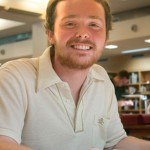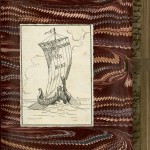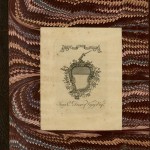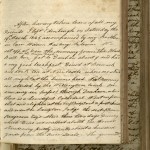Joe Marshall recently graduated from The University of Texas at Austin, where he majored in Plan II Honors. He spent time in the Ransom Center’s reading room as he prepared to choose his senior thesis topic, and he shares that experience here.
Arriving at the Ransom Center, I didn’t have anything particular in mind. I wanted to explore primary materials as one of any number of possible venues for thesis work; my keenest interest was in journals, diaries, and the like. I’d been encouraged by a friend’s experience reading the journal of T. H. White—best known for his book The Once and Future King—during the early years of the London Blitz, when the damage inflicted by Adolf Hitler’s bombs was reaching its terrifying crescendo. My friend told how White thought he was witnessing the birth of Hitler’s “Thousand-year Reich” and the end of England and Western civilization as he knew it. I was fascinated. This was experiencing reality directly through the eyes of another: feeling their feelings, suffering their travails, witnessing their very thoughts as much as one could—or one ever can. So I came in, watched the instructional video, completed the requisite training, and asked to see manuscripts from Journal of My Life in India, 1825–1857 by Lieutenant Colonel Alexander Cumming Dewar (1803–1880).
And they gave it to me. I could see and touch, smell and hear (but not taste, crucially) the tiny leather-bound book—the creak of its worn pages—without any of the SWAT gear or hazmat suit I naturally assumed would be necessary. And as I leafed through the surprisingly pristine pages and the tiny script (script!) this meticulous British person had lain down a truly incomprehensible age ago, I came to a stark and sudden realization: this person was not me. They weren’t even a nineteenth-century facsimile of me—a more educated, more analog, but still recognizable permutation of myself.
“Four died a-midships last night” the tiny hand would read. “Spoke with the captain this morning about disembarking for a time in Bengal” the next line would continue, coolly accustomed to the habit people had in that age of, well, dying aboard a tiny wooden ship as it sailed half a world away without GPS or 4G or—perish the thought—even TiVo. I had come to the Ransom Center expecting to inhabit another person, to play around in the thoughts they chose to pen, and to assume their consciousness as one would put on a pair of especially difficult pants. But what I realized was that the gulf of time separating us was so vast and filled with wonder, that I could never truly know them. They (he) was as alien to me as the great gas giants or the terrain of the abysmal deep, except perhaps more so. You can study Jupiter or map the ocean depths, but you can never recreate a person with all the historical context, life experience, and accumulated wisdom of their time. You can only glimpse and hope that glimpse enlightens.
I ended up doing something else entirely for my thesis (something about music and authenticity or some such). But, while it would be clichéd and untrue to say I never forgot, I believe I will always feel the impact of that day’s search. It was too exciting and too unexpected to not worm its way into me—as deep (have I said it?) as the ocean depths.
Please click the thumbnails below to view full-size images.





